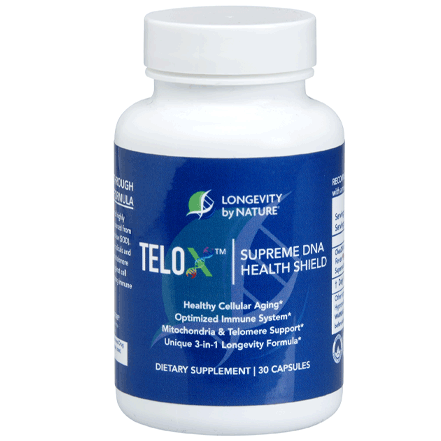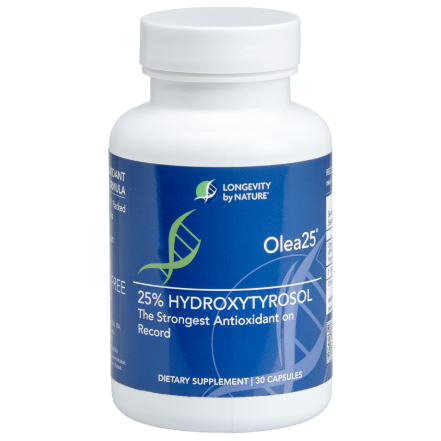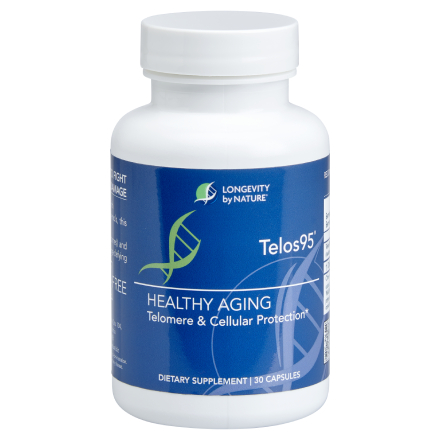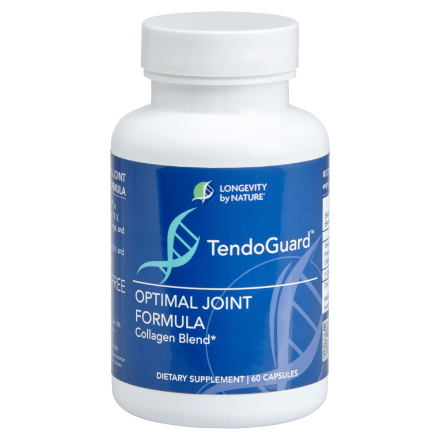Everyone is familiar with the term DNA, but few people remember telomeres from their High School science classes. However, this small part of your DNA may be responsible for warding off disease and even slowing the aging process. So, what is a telomere, and what is its function?
What Is a Telomere and Its Function?
In the simplest of terms, telomeres are like the plastic or metal caps on your shoelaces that stop them from fraying, only for your DNA. In reality, they are structures at the end of each chromosome. Each telomere is comprised of a sequence of 3000+ bases (bases are units of genetic instructions).
Telomeres have a wide range of functions, which we’ll explore in more depth below. Telomeres play a critical role in our bodies. They:
- Prevent our chromosomes from sticking to one another
- Make sure our chromosomes are properly organized within our cells
- Ensure our DNA is correctly copied when cells divide
Telomere Function in a Cell
Our bodies are constantly changing; our cells divide to replace old and damaged cells. When our cells divide, the string of DNA that is copied across to the new cell gets shorter. If your telomeres are healthy, very little DNA will be lost, and the most important DNA will be protected.
When DNA becomes damaged, the telomeres will notify the body so it can be repaired or dealt with, so it will not be replicated. This process can go wrong – cancer is an example of what happens when damaged DNA goes unchecked and continues to replicate.
Telomere Function in Medicine
Since telomeres are so important to our health and may even hold the key to slowing the aging process, they are of great interest to pharmaceutical companies and doctors. However, science hasn’t yet found a way to encourage telomere health and longevity, outside of nutrition. Researchers in 2015 suggested they believed they could increase telomere length by up to 10% with stem cell therapy, but little progress has been made in the past 5 years. However, in 2018, researchers at Certified Nutraceuticals, Inc., a leading company in research & development in anti-aging supplements validated the first Human Clinical study to support telomeres. It took 10 years of research & development and finally succeeded by introducing a plant based supplement to support telomeres. In fact, study showed that in just six months telomere length increased by 80% and cellular age decreased by an average of 7.42 years.
Telomere Function in Aging
You may have heard that our body fully replaces itself every 7 years – that’s because our cells are constantly replacing dead cells. This is most obviously seen in our skin, where you can exfoliate to remove dead skin cells and reveal new, healthy skin.
What you might not know is that one of the reasons why we age is because we lose bases every time a cell divides – 25-200 on average. When a telomere loses too many bases, it can no longer be replicated, which triggers cell death. The length of our telomeres is linked to our biological age, so the shorter your telomeres, the older you are from a biological standpoint. The healthier and more long-lasting our telomeres, the younger our biological age.
Telomere Function in Cancer
Our telomeres protect us from having damaged DNA. They work to keep our cells healthy and organized correctly. When a telomere is damaged, it cannot properly tell our bodies if the DNA they’re connected to is damaged, which means the body may continue to replicate it. In a healthy cell, telomeres will spot damage that can lead to cancer and notify the body to destroy the offending cell. If that doesn’t happen, the cell will start to multiply, leading to cancer.
Telomere Function in DNA Replication
When our cells divide, our DNA must be replicated. When this happens, a little of the information in the DNA is lost, but your telomeres will protect the most essential genes from being lost. That means that the new cell will retain your essential genes and go on to be healthy and function properly. If your telomere does not do this efficiently for any reason, you’re likely to lose more DNA more quickly, and the new cell may even lack those necessary genes that will ensure it is a productive and healthy cell.
The Role Telomeres Play in Disease and Illness
Osteoporosis and Inflammatory Diseases Such as Arthritis
Osteoporosis is a disease that causes bones to repair and grow abnormally, and arthritis can lead to joint deformities at its most extreme. Many studies now link telomere shortening to these diseases, and researchers believe that studying someone’s telomeres can act as a marker for the progression of these diseases. Protecting your telomere health can slow the progression of these diseases.
Telomeres & Cardiovascular Disease
Cardiovascular diseases are linked to many degenerative issues within the body, often caused by a lack of proper nutrition, obesity, and other lifestyle choices that can damage cells, such as smoking. When telomeres are shortened to a critical length, they fall into disfunction. These lifestyle choices accelerate the rate of telomere shortening through the increased stress, inflammation, and oxidation in the cells.
Telomeres & Stroke
Telomeres have also been studied extensively in relation to stroke. One analysis looked at the participants in 11 studies (totaling 25,340 people) and their telomere length. The results found that shortened telomere length was significantly linked with stroke.
Telomeres & Diabetes
Similarly, studies have found that patients with Type 2 diabetes (which is often a result of obesity) typically have shortened telomeres. It is a chicken and the egg situation in that it’s not clear yet whether the shortened telomeres caused diabetes or vice versa, but it is reliably apparent. Type 1 diabetes patients also often have shortened telomeres, but in both situations, it is cell failure that triggers diabetes.
Telomeres & Cognitive Impairment / Dementia
Telomere length is also linked to cognitive impairment, especially in the cases of age-related diseases such as dementia, specifically Alzheimer’s. Studies have found that the critical shortening of leukocyte telomeres is associated with the onset of dementia.
What Can Lead to Loss of Telomere Function?
Telomere function degrades when:
- There is DNA damage in telomeric repeat sequences
- Natural aging
- Damage to cells through free radicals through oxidative stress (caused by smoking, obesity, pollution)
Tips to Improve Telomere Function
So, how can you improve your telomere health and protect them from harm?
- Maintain a Healthy Weight
Obesity is a key indicator of shortened telomeres, but being underweight is also best avoided, too. - Exercise Regularly
You don’t need to be going to an intensive CrossFit class every weekday; even daily walks will help. One famous study found that a group of regular male runners in their 50s had the same length of telomere as men in their 20s, while sedentary men in their age group had telomeres that were 40% shorter than the men in their 20s. - Manage and Avoid Chronic Stress
Most of us have adapted to endure high-stress lives. However, we need to be careful and conscious of when our careers and other stressful situations are costing us our health. A study found that people struggling with difficult caregiving, stressful work environments, and financial difficulties had shorter telomeres than those in the control group. - Eat a Nutritionally Rich Diet
our body uses the micro and macronutrients in our food as the building blocks for our body’s repair and growth, so if you don’t eat nutritionally dense foods, your health will start to suffer. When our bodies are placed under additional stress and malnutrition, our telomeres shorten more quickly. By eating plenty of vitamins and minerals, we can better provide the nutrition our body needs to work optimally. - Take Natural Supplements
It is extremely difficult to get all of our nutritional needs from our food. We are busy people and eating a wide range of fruit and vegetables isn’t always possible. The best way to ensure your body gets all the vitamins and minerals your body needs is to take a natural supplement. The best all-around supplement designed for telomere health, and the only clinically proven supplement is Telos95. Telos95 uses proprietary plant-based polyphenols to fight free radicals in your cells and ensure they are nourished with nutrients that promote telomere longevity.
Protecting the health of our telomeres is as close to pausing the aging process as we’re currently going to get. While some beauty treatments can help you continue looking youthful on the outside, protecting your telomere health is the best way to ensure you stay young on the inside, too. Telos95 is soy-free, gluten-free, GMO-free, filler free, excipient free, pesticide free and supplies your body with plant-based nutrients that easily permeate through the cell wall. Telos95 is the only formula backed by a human clinical study that has been proven to halt significant telomere shortening and was even found to lengthen them after just 6 months, and decrease your cellular age by an average of 7.42 years.
Why are supplements so important to our health?
In an ideal world, we would all eat well all the time. Even if the food we ate were as pure as the water, it still couldn’t provide the optimal amount of specific nutrients. To protect our telomeres (the protective ends of our Chromosomes that support healthy cell replication) we must push our first defense to high alert. The bottom line is that no matter what some nutritionists may say, depending solely on food for your nutritional needs is not enough. If you want to keep your telomeres healthy, you need the right foods and supplements to put up the strongest possible defense against the disease of aging, to which you would otherwise fall victim”
To find out more about the clinical study, ingredients, or to purchase Telos95, check out our Telos95.
For more clinical study information related to the function of a telomere, below are additional resources:
- A Home Use Study in Healthy Volunteers to Assess Effectiveness of a Dietary Supplement to Halt the Shortening of Telomere Length as Demonstrated by the “Cawthon qPCR Assay”
- A randomized-controlled clinical study of Telos95® , a novel antioxidative dietary supplement, on the shortening of telomere length in healthy volunteers
Resources:
- Scientists find way to increase length of human telomeres
medicalnewstoday.com/articles/288515#New-method-increased-telomere-length-by-up-to-10%







